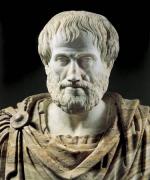|
This section contains 5,353 words (approx. 18 pages at 300 words per page) |

|
SOURCE: "The Character of Aristotle's Thought and His Philosophic Method," in Aristotle and His Philosophy, The University of North Carolina Press, 1982, pp. 30-39.
In the following essay, Edel reviews Aristotle's method of philosophical analysis, noting its strengths and weaknesses. Edel states that Aristotle's "mode of inquiry" is characterized by a common-sense attitude, by pluralistic contextualism (that is, the notion that an idea must be understood within a specific, rather than universal, context), and by his treatment of the world as possessing a single order of nature.
The analytic character of Aristotle's thought is inherent in his method. He does not first get an idea, work out its implications, and then go looking for evidence. Instead, he first assembles a wide array of opinion and information in the form of common beliefs (endoxa), including previous theories, common linguistic usage, and reported observations. He then takes the greatest pains with...
|
This section contains 5,353 words (approx. 18 pages at 300 words per page) |

|


